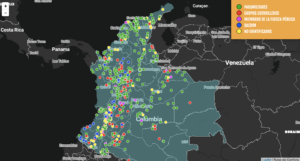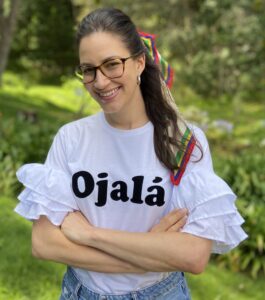Víctor García Perdomo is a professor at Universidad de La Sabana, in Bogota, Colombia, and María Isabel Magaña is a PhD student at the University of Maryland.
An investigation that we recently published on 14 data journalism units in Latin America revealed that the way reporters and media adopt digital technologies to collect, process and visualize data is not only redefining journalistic practices, but also encouraging a deep commitment to democracy, transparency and collaboration in particularly hostile environments.

Researcher Víctor García Perdomo (Courtesy photo)
These changes in journalistic practices expand the boundaries of the profession and at the same time blur the boundaries between reporting and activism.
The impact of digital technology has allowed the configuration of multidisciplinary data journalism units, in which reporters work in small units shoulder to shoulder with technologists, coders and designers, integrating computer sciences, journalism and design in the same environment and expanding the boundaries of journalism to produce stories with data.
These interdisciplinary dynamics have allowed reporters and data units to adopt logics closely related to open sourcing and coding to ensure transparency and obtain the freedom that free pre-built platforms do not offer.
Using in-depth interviews with 14 media directors and editors from Brazil, Mexico, Colombia, Argentina, Peru, Venezuela, Costa Rica and Cuba, and content analysis of 210 reporting specials produced by these units, the research shows that data journalism is also implementing disruptive practices to collect information.

Journalists at the Colombian platform Rutas del Conflicto have mapped the country’s armed conflict based on citizen testimonies, local archives and public government information. In this map, they documented 730 masacres from 1982 to 2012. (Screenshot: Rutas del Conflicto)
Trying to overcome the lack of transparent and reliable databases in the region –both governmental and private– data units and journalists have at times decided to build their databases from scratch using different sources and resources. For example, Colombia's Rutas del Conflicto has reconstructed data on victims of that country's internal conflict using social leaders, local archives and communities as sources of information.
The research analyzes the data units of both traditional media such as La Nación of Argentina, El Universal of Mexico and Folha de S.Paulo of Brazil; as well as native digital media such as Ojo Público from Peru, RunRunes from Venezuela and Proyecto Poder from Mexico; as well as media specialized in data processing and visualization such as DataSketch from Colombia, PostData.club from Cuba, and LaData.mx from Mexico.
The two most recurrent obstacles to reporting with data in the region – incomplete files and limited access to public reports – have created a kind of activism among data journalists in Latin America because they must bluntly confront both governmental and private powers to carry out their work, which reinforces fundamental principles of the profession such as field reporting with communities and filing freedom of information appeals with authorities to obtain public documents.

María Isabel Magaña (Courtesy photo)
Data reporters from Brazil, Colombia, Costa Rica, Cuba and Mexico recognize that, in general, access to public data is intentionally restricted by governments and institutions in Latin America, such that they must constantly confront governments, public servants, agencies and other organizations to obtain information legally and tell the stories.
Our content analysis of 210 special reporting pieces produced by these data units shows a particular interest in covering stories related to corruption, human rights and social problems in the region. This trend highlights the data units’ commitment to journalism’s social commitment.
Despite this, our research finds that digital-native news outlets tend to cover these social aspects with greater intensity than traditional media, which remain attached to issues such as politics.
This study highlights the intertwined dynamics of technology, journalistic values and a deeply rooted democratic mission among Latin American journalists, a hallmark of the region.
For us, it is essential to share this study and make visible the uniqueness of Latin American data journalism to "de-Westernize" academic literature and expand the spaces in which the brave work of reporting in our region is highlighted.
With this effort, we want to contribute to the comprehensive analysis of data journalism practices in Latin America, which are often overlooked in the global discourse. By including regional perspectives from the Global South, this study enriches the discussion and offers a more holistic view of the global data journalism landscape.